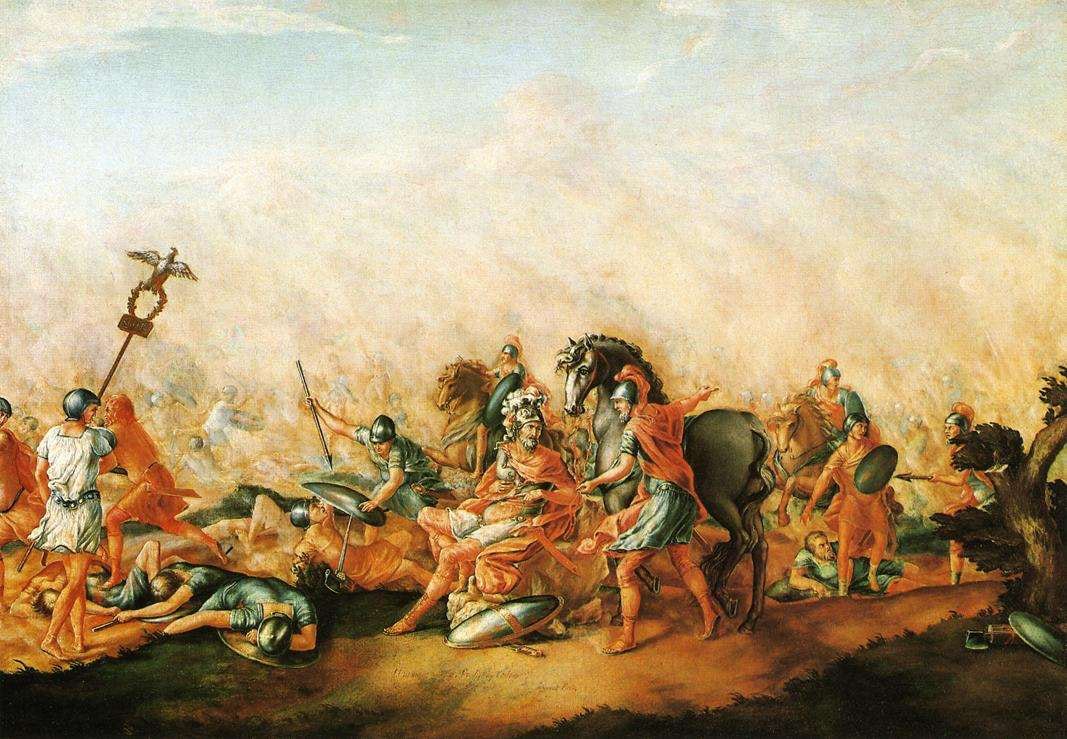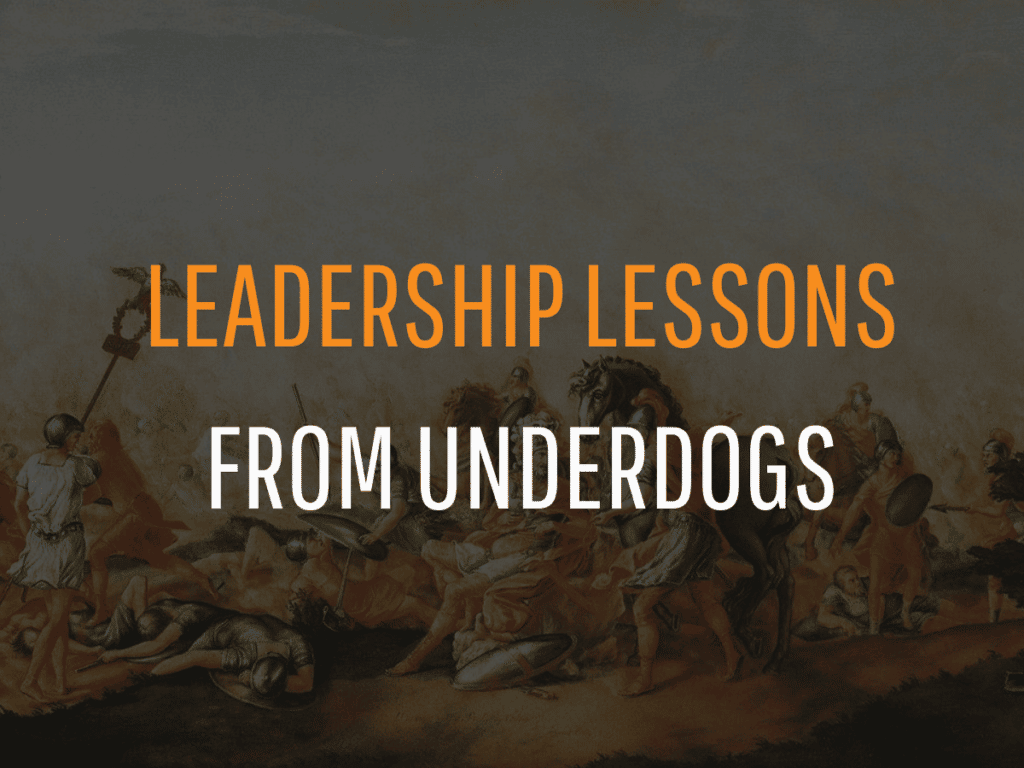“When a humble and much inferior combatant is matched against a celebrated and seemingly invincible athlete, the sympathy of the crowd is at once given to the inferior man.” — Polybius, 212 BC
We all love an underdog.
There’s something about seeing an individual or an entity that is against the ropes, struggling to survive, and giving it their all to make a comeback.
In America, the notion is nearly baked into the recipe of our origins: the scrappy Minutemen and ragtag bands of troops with bare feet who served under George Washington were able to defeat the most powerful military force in the world.
Here are a handful of examples of underdogs, past and present.
They Said It Couldn’t Be Done
In 216 BC, the Carthaginians and their allies, led by Hannibal (who had previously crossed the Alps with his army and elephants), seized control at Cannae. It was a strategic strike, as the grain depot there was a critical link in the Romans’ supply chain.
The Romans sent some 86,000 troops to meet with Hannibal’s force that was perhaps half that size. But the group assembled by Hannibal was of such a variety that there was no single method of fighting or of arms; the Romans were thrown into disarray.
The casualties on the Roman side were massive; estimates range from 50,000-60,000 killed, with another 4,000 taken prisoner. Only about 8,000 of Hannibal’s men were killed.
It was a stinging defeat for the Romans and is regarded as one of the greatest tactical feats in military history.
[No elephants were harmed in the making of this battle.]

Source- The Death of Aemilius Paulus at the Battle of Cannae by John Trumbull, 1773 (Wikipedia – public domain)
Standing Up to Bullies
The war that Russia—a superpower—is waging against Ukraine is a perfect example. The world watched as Russian troops gathered and prepared for an attack on the country; it played out in slow motion and transparency (for those outside of Russia).
However, the fall of Kyiv, what most people assumed was a fait accompli, hasn’t happened, thanks to the pluck, grit, and fierceness of the Ukrainian people. Not to mention the courage, tenacity, and leadership of their president, Volodymyr Zelensky.
His communication is frequent and clear, and he has shown himself leading by example. He is out in the streets, he is welcoming world leaders, he is broadcasting from his office in Kyiv — not hiding in a bunker.
The entire world is rooting for this particular underdog.
The Most Astounding Two Minutes
Even people who are not horse racing aficionados heard about what was probably the greatest Kentucky Derby of all time: Rich Strike, the longest shot (at 80-1 odds) winning the 148th running, after being in 15th place at the one-mile mark and surpassing the favorite by three-quarters of a length at the finish line.
It was a story that couldn’t have been written any better. Watch the action if you haven’t yet seen it (or watch it again, because it’s that captivating):
But as with any moment of triumph or “overnight success,” there are lessons we can glean from how a winner got there.
5 Lessons from Underdogs
The entire team behind Rich Strike didn’t go into the Kentucky Derby expecting to win. At 80-1, they were the long shot. Those kinds of odds almost forced humility upon them.
But they knew they were given a gift and they didn’t want to squander it.
Rider Sonny Leon immediately saw an opportunity out of the gates. The other horses were sprinting at a suicidal pace, with the leads making the quarter-mile and half-mile times among the top three in Kentucky Derby history.
Leon knew that he needed to bide his time and coax Rich Strike into action when the time was right. They were in 17th place at the quarter-mile and 18th at the half.
1. Leaders have a can-do spirit
After the race, Leon said, “People kept asking me if I was nervous to ride in my first Kentucky Derby. I said, ‘No, I wasn’t nervous. I was excited.’ I was on an 80-1 shot and nobody knew my horse — but I did. I didn’t know if we could win, but I had a good feeling with him.”
Bringing a sense of optimism, energy, and heliotropic leadership to your team can inspire everyone to want to win. It all starts with building relationships and trusting each other, and moving forward together.
2. Leaders have patience
Leon didn’t ask Rich Strike to bolt out of the gate or to try to make up for his position after the first mile markers. He waited until the time was right and then asked the horse to go.
At the top of the stretch, Leon moved Rich Strike to the rail; but it wasn’t a sure thing. “I waited,” Leon said, “and the rail opened up.”
Leaders know that timing is everything, and a poorly timed announcement or launch can doom a product. When you have a feel for the market, the competitors, and your team, you can be more confident in a win.
3. Leaders have courage
After riding the rail for a bit, Leon swung Rich Strike to the outside of Messier, then in third. That bit of confidence sent the horse soaring, as he came from behind to outflank Epicenter and Zandon at the finish line.
At those moments when everything is on the line, we have a decision to make: play it safe or take a risk to attempt something we’ve never done. It will always be a judgment call, and it takes courage.
“Courage is resistance to fear, mastery of fear—not absence of fear.” — Mark Twain, 1894
The overhead view makes Rich Strike's comeback for the upset @KentuckyDerby win look even more incredible. ? #KyDerby | @ChurchillDowns pic.twitter.com/iDfkGVZS0O
— NBC Sports (@NBCSports) May 8, 2022
4. Leaders learn from each other
Rich Strike’s trainer Eric Reed said of Leon: “He helped me train this horse. This rider has ridden him all along. [Rich Strike] learned the process and [Leon] taught him how to ride through horses and pass horses.”
A leader like Reed knows that even though he is the trainer, training is a collaborative effort. The trainer, the rider, and the horse all participate. Even someone as slight as the 110-pound rider could teach a large majestic horse how to navigate between other horses.
Every leader should listen to people on their team, regardless of their stature or title. They may be able to see things that are in your blind spot.
5. Leaders savor the moment
After this win—the most significant in his career—reporters asked Sonny Leon how it might affect his future. He replied, “I want to enjoy this moment. We’ll see what happens tomorrow.”
Leaders know that planning for what’s next is essential, but they also know that, particularly after significant wins, it’s healthy to enjoy your successes and to enjoy the journey.
There will always be more to do, but taking the time to appreciate each other and the fruits of our labor is essential to team morale and our own mental health.
There is no guarantee that underdogs will always win. That’s part of the excitement of rooting for them.
But win or lose, leaders know that humility, patience, courage, and collaboration can make a difference in overcoming obstacles.





